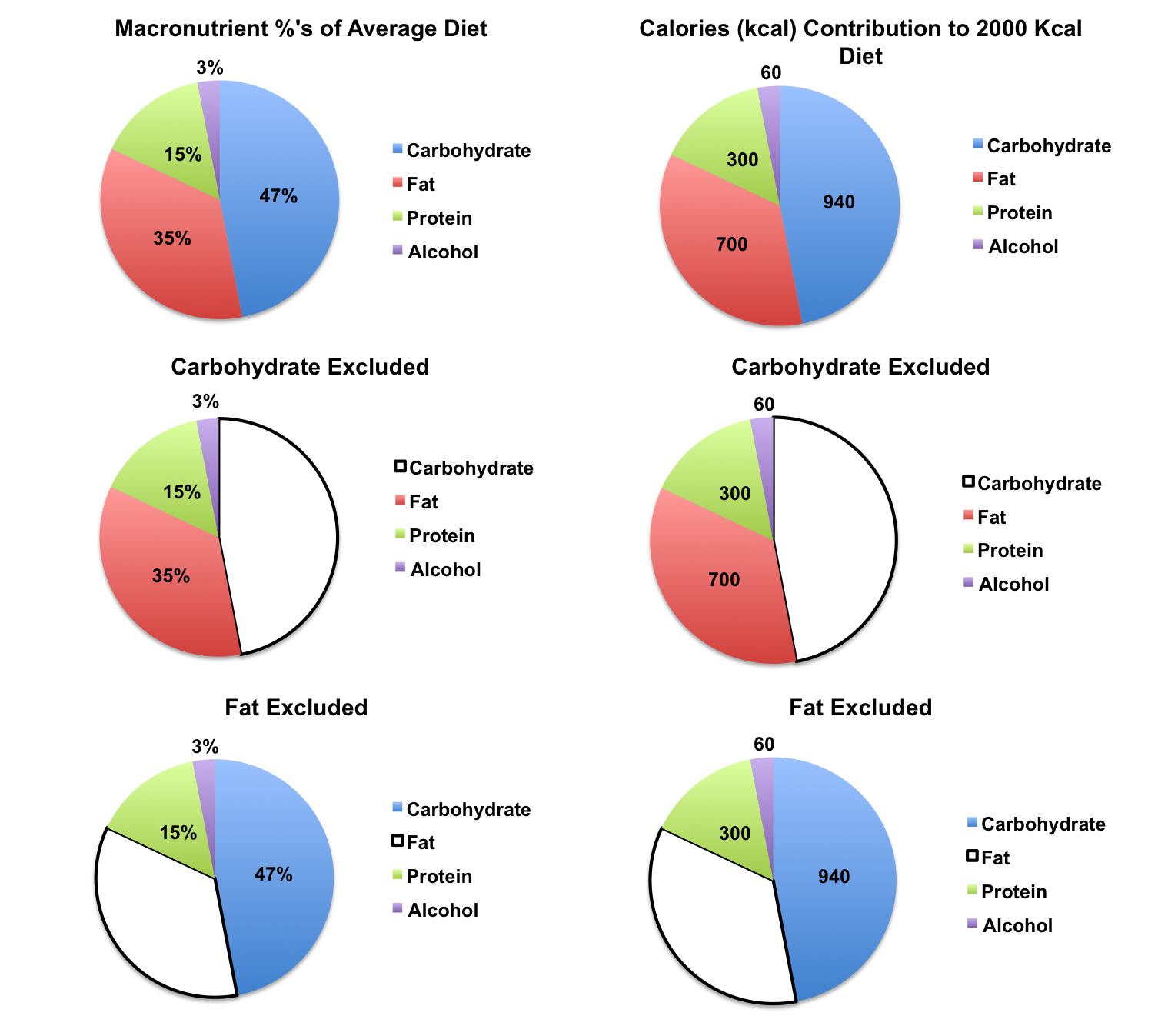What is the “best” diet to lose weight? Low-carbohydrate? Low fat? High-protein? The answer is all of the above and none of the above. As I have mentioned in a previous blog post, there is a diet book for anything and everything you can imagine. Not all, but a vast majority of diets tend to focus on elimination. These diets are sometimes disguised as primal, detox, juicing, or metabolism revving, but if they have any chance of working they tend to fall into one category: elimination.
For example, the two top graphs below show the typical macronutrient distribution of the average American’s diet. We tend to get ~47% of our calories from carbohydrate, ~35% from fat, ~15% from protein, and ~3% from alcohol. For an individual consuming 2,000 calories/day, which is the recommended number of calories for a relatively sedentary 150 pound man, these percentages equate to 940, 700, 300, and 60 calories for carbohydrate, fat, protein, and alcohol respectively. Now, if you take a look at the middle two graphs, you see that if we go on an Atkins type diet where we decide to restrict carbohydrate, we are excluding nearly 50% (or 1,000 calories) of the calories we were previously consuming. If, on the other hand, we are going to go on a very low fat diet, we are now excluding ~35% (or 700 calories) of our daily calorie consumption. In either case, you are probably going to find it quite difficult to replace all those calories when you are not allowed to eat anything from an entire food group.
Macronutrient composition of the average American's diet and the effect on total calorie intake when carbohydrate or fat are excluded expressed as total calories and percentage of total calories (adapted from GL Austin, et al. 2011 Am J Clin Nutr).
At this point you might be saying, “So what’s your point. If I cut out an entire food group, I will lose weight and that is what I want, right?” Yes, you will lose weight, at first. I cannot argue with that. However, can you maintain that weight loss over time? The answer for most people seems to be no. For example, when four popular weight loss diets, Atkins, Zone, Weight Watchers, and Ornish, were compared over the course of twelve months, you can see in the graph below that all of the weight lost by the participants of this research study was lost over the course of the first two months. Thereafter, weight loss plateaued and some weight was even regained.
Weight loss over the course of 12 months on the Atkins, Zone, Weight Watchers, or Ornish diets (adapted from ML Dansinger, et al. 2005 JAMA).
When you compare these weight loss trends with dietary adherence in the next graph below you’ll find that adherence to the diet was greatest at the start of the diet and declined thereafter (0 indicates no adherence whatsoever and 10 indicates absolute adherence). It’s nearly impossible to maintain the compliance you were able to at the start of the diet over the course of time. Despite your best intentions, life gets in the way and your attention is drawn elsewhere.
Dietary Adherence to Atkins, Zone, Weight Watchers, or Ornish diets over the course of 12 months (adapted from ML Dansinger, et al. 2005 JAMA).
There are numerous weight loss companies that have tried to solve this intensity/motivation/life gets in the way problem by offering prepackaged meals to their clients. Hey, this approach takes the guesswork out of things. You know exactly what you are going to eat and when you are going to eat it. There is little to no preparation time involved. These foods are portion controlled and if you follow their plan you will most definitely lose weight. However, do you want to eat prepackaged meals the rest of your life? Most people would answer with a resounding, HELL NO!
This is why I want to offer you another solution and a better way of eating. Instead of eliminating food types and food groups or eating prepackaged and pre-portioned microwave dinners why don’t we slightly modify the foods that you already eat and already like to eat? I’m not saying that we make you eat only low fat this and low fat that or all broccoli, Brussels sprouts, and kale. The food you eat has to taste good and fit at least some of your wants/needs or you’re not going to stick to your plan. There are times when you want to eat food that is high in carbohydrate. There are other times when you will crave foods that are high in fat. Why punish yourself by saying that you will never eat one or the other of these foods again? Instead, why don’t we plan on eating high carbohydrate or high fat meals at certain times and low carbohydrate or low fat meals at other times? The bottom line is dieting does not work. If you are ready to ditch your diet for a more moderate, balanced, and sustainable approach to eating, please shoot me an email or give me a call. Together we can figure out a truly customized meal plan for you.
Todd M. Weber, PhD, MS, RD
References:
- Austin GL, Ogden LG, Hill JO. Trends in carbohydrate, fat, and protein intakes and association with energy intake in normal-weight, overweight, and obese individuals: 1971-2006. The American journal of clinical nutrition. Apr 2011;93(4):836-843.
- Dansinger ML, Gleason JA, Griffith JL, Selker HP, Schaefer EJ. Comparison of the Atkins, Ornish, Weight Watchers, and Zone diets for weight loss and heart disease risk reduction: a randomized trial. JAMA : the journal of the American Medical Association. Jan 5 2005;293(1):43-53.


